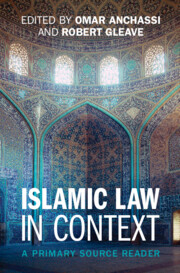Book contents
- Islamic Law in Context
- Islamic Law in Context
- Copyright page
- Contents
- Acknowledgements
- Contributors
- Introduction
- Part I Islamic Legal Theory (Uṣūl al-Fiqh) and Related Genres
- Part II Islamic Jurisprudence (Fiqh) and Related Genres
- Part III Legal Opinions (Fatwās)
- Chapter 17 Introduction to Part III
- Chapter 18 Ottoman Fatwās on the Substitution of Defunct Endowment Properties, from al-Aqwāl al-Marḍiyya of Qāḍīzādah Muḥammad Ṭāhir (d. 1254/1834)
- Chapter 19 Settling Disputes among Nomads
- Chapter 20 Fatwās on Aspects of Modern Life
- Chapter 21 ‘According to the Qaul Muʿtamad it is Unlawful and Invalid’
- Chapter 22 An Online Fatwā from the Dār al-Iftāʾ al-Miṣriyya on Women’s Leadership
- Chapter 23 ‘His Doctrine is Deviant’
- Part IV Court Judgments and Other Court Documentation
- Part V Judicial Manuals and Reference Books
- Part VI Alternative Sources for Islamic Legal Studies
- Name Index
- Subject Index
- References
Chapter 22 - An Online Fatwā from the Dār al-Iftāʾ al-Miṣriyya on Women’s Leadership
from Part III - Legal Opinions (Fatwās)
Published online by Cambridge University Press: 14 November 2024
- Islamic Law in Context
- Islamic Law in Context
- Copyright page
- Contents
- Acknowledgements
- Contributors
- Introduction
- Part I Islamic Legal Theory (Uṣūl al-Fiqh) and Related Genres
- Part II Islamic Jurisprudence (Fiqh) and Related Genres
- Part III Legal Opinions (Fatwās)
- Chapter 17 Introduction to Part III
- Chapter 18 Ottoman Fatwās on the Substitution of Defunct Endowment Properties, from al-Aqwāl al-Marḍiyya of Qāḍīzādah Muḥammad Ṭāhir (d. 1254/1834)
- Chapter 19 Settling Disputes among Nomads
- Chapter 20 Fatwās on Aspects of Modern Life
- Chapter 21 ‘According to the Qaul Muʿtamad it is Unlawful and Invalid’
- Chapter 22 An Online Fatwā from the Dār al-Iftāʾ al-Miṣriyya on Women’s Leadership
- Chapter 23 ‘His Doctrine is Deviant’
- Part IV Court Judgments and Other Court Documentation
- Part V Judicial Manuals and Reference Books
- Part VI Alternative Sources for Islamic Legal Studies
- Name Index
- Subject Index
- References
Summary
This chapter explores the 2012 legal opinion (fatwā) issued by the Egyptian Dār al-Iftāʾ—the body officially tasked with providing Islamic legal advice by the Egyptian state—on women’s capacity to serve as heads of state. In the course of discussing the issue, the authors apologetically asserts that there is not and has never been a ‘woman question’ in Islam, i.e. that there has never been any restriction on women’s agency ‘in Islam’ per se and that women are not in the least bit excluded from acting in the public sphere. The authors present examples of Muslim women serving as heads of state, judges and in other executive and public order roles, as well as minority legal opinions, in order to demonstrate their contention.
Keywords
- Type
- Chapter
- Information
- Islamic Law in ContextA Primary Source Reader, pp. 234 - 244Publisher: Cambridge University PressPrint publication year: 2024

